Princeton University Athletics

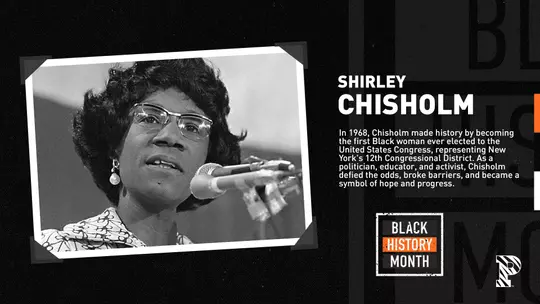
Shirley Anita Chisholm (November 30, 1924 – January 1, 2005) stands as one of the most significant figures in American history, a trailblazer whose tireless efforts not only shaped the political landscape but also championed the causes of marginalized communities, particularly African Americans and women. As a politician, educator, and activist, Chisholm defied the odds, broke barriers, and became a symbol of hope and progress.
Born in Brooklyn, New York, to immigrant parents, her father was from Guyana, and her mother was from Barbados Chisholm's early life was marked by her exposure to the challenges of being a child of immigrants and growing up in a segregated society. She attended Brooklyn College, where she earned a degree in sociology, and later pursued a master's degree in education at Columbia University. It was during her years in academia that Chisholm began to recognize her deep commitment to social justice and equity, laying the foundation for her future activism.
Shirley Chisholm's political career is marked by her groundbreaking achievements as a Black woman in a field dominated by white men. In 1968, Chisholm made history by becoming the first Black woman ever elected to the United States Congress, representing New York's 12th Congressional District. Her resolve to represent her community was fueled by a belief that Black voices and women's issues had long been marginalized.
In Congress, Chisholm's legislative work focused on improving social services, education, and welfare programs, which she believed were crucial for the empowerment of poor Black communities. Her unyielding advocacy for civil rights and the rights of women led her to sponsor numerous bills, fighting for issues such as racial equality, economic justice, and the protection of the most vulnerable in society. She became a staunch advocate for the poor, immigrant, and working-class communities, particularly women of color.
One of Chisholm's most defining moments came in 1972 when she became the first Black woman to run for the Democratic nomination for President of the United States. Chisholm's decision to run was not just a political move but a profound statement about the need for greater representation in the highest levels of American government. Running on a platform of racial justice, women's rights, and opposition to the Vietnam War, Chisholm's candidacy broke barriers in a political system that had traditionally sidelined people of color and women.
Although she did not win the nomination, Chisholm's campaign was a testament to her belief in the power of representation and her commitment to dismantling systemic barriers. She faced racial and gender discrimination throughout the campaign, but she never wavered in her belief that all people, regardless of their background, deserved a voice in government. Her presidential bid inspired future generations of Black women and men to pursue positions of power and challenge the status quo.
Chisholm was also a founding member of the Congressional Black Caucus and played an instrumental role in elevating issues that disproportionately affected Black Americans. Her work focused on advocating for welfare reform, better educational opportunities, and improved healthcare for Black communities. She understood the intersectionality of race, gender, and class, and fought for policies that addressed the unique challenges faced by Black women in America.
Chisholm was a key figure in the establishment of the Women’s Caucus in Congress, a body dedicated to addressing issues that disproportionately affect women, including reproductive rights, equal pay, and violence against women. Her political career demonstrated that intersectionality was not only a theoretical concept but a real, lived experience for millions of Black women who faced multiple layers of discrimination.
Shirley Chisholm's life was a testament to the power of resilience, activism, and trailblazing leadership. She embodied the spirit of Black excellence and empowerment, breaking down walls of prejudice and paving the way for future generations of women and people of color in politics. Her impact extends beyond her legislative work and presidential campaign. Chisholm’s courage to challenge the status quo and her fierce advocacy for the underrepresented and disenfranchised have left a lasting imprint on American society.
Shirley Chisholm's legacy is not just that of a trailblazer, but of a visionary who saw beyond the limitations of her time. She knew that to create a truly just society, people of color and women had to be in positions of power. Her groundbreaking achievements in politics, her bold presidential bid, and her lifelong advocacy for equality and justice have made her an iconic figure in both Black history and the history of American politics. As we celebrate Black History Month, Shirley Chisholm’s story reminds us of the power of persistence, representation, and the belief that anyone, no matter their background, can make a transformative impact.
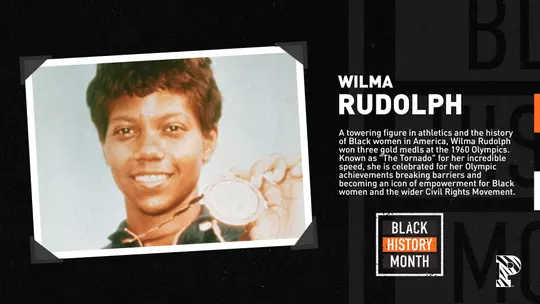
Wilma Rudolph, born June 23, 1940, in St. Bethlehem, Tennessee, is a towering figure in athletics and the history of Black women in America. Known as "The Tornado" for her incredible speed, she is celebrated for her Olympic achievements breaking barriers and becoming an icon of empowerment for Black women and the wider Civil Rights Movement.
Wilma Rudolph was the 20th of 22 children in her family, raised in a segregated and racially discriminatory environment. She faced numerous hardships from the start of her life. She contracted polio at the age of 5, which left her with a weakened left leg and the possibility of permanent disability. For many children of color in the South, such challenges could limit their future prospects. Yet, Wilma’s determination was unwavering. After years of physical therapy and overcoming the odds, she began walking again, even wearing a leg brace for a time.
Rudolph’s journey to athletic greatness began in high school when she became a star basketball player. However, it was track and field that truly brought her into the global spotlight.
Wilma’s track and field career began to flourish when she attended Tennessee State University, where she was coached by the legendary Ed Temple. It was here that her speed, strength, and resolve came to the forefront. She soon became the first American woman to win three gold medals in a single Olympic Games.
At the 1960 Rome Olympics, Wilma Rudolph made history. She won three gold medals—one in the 100 meters, one in the 200 meters, and one in the 4x100 meter relay. This was an unprecedented achievement for a Black woman and an athlete of her stature. Her victory in these events not only shattered existing records but also served as an inspiration for Black women, athletes, and the broader community fighting against racism and gender inequality. Her 100-meter victory, where she finished with a time of 11.0 seconds, became an Olympic record, and her victory in the 200-meter race set another record.
Wilma’s accomplishments at the Rome Olympics made her an international symbol of excellence, breaking through barriers of both race and gender. She became a symbol of pride for African Americans during the Civil Rights Movement, as well as a trailblazer for Black women in sports. Her success defied the social expectations of the time, especially for Black women, whose potential was often underestimated or outright ignored.
Wilma Rudolph’s innovation in sports and society extended far beyond her Olympic triumphs. She was one of the first Black women in the United States to achieve such widespread acclaim, and her victories helped pave the way for future generations of Black athletes. Her achievements influenced a new era of female and Black athleticism, both on the track and in other sports, encouraging Black women to pursue careers in athletics, education, and beyond.
Her legacy in athletics is marked by her unwavering spirit, exceptional work ethic, and role in reshaping how society views Black women and athletes. She used her fame to challenge the racial segregation that pervaded the sports world at the time and became an important figure in promoting racial and gender equality. Rudolph was known not only for her victories but also for her advocacy for civil rights and equal opportunities for women and minorities.
Wilma Rudolph received numerous awards and honors throughout her life. In 1961, she was named the Associated Press Female Athlete of the Year and was inducted into the U.S. Olympic Hall of Fame in 1983. Rudolph also received the Congressional Gold Medal, the highest civilian honor in the United States, and the James E. Sullivan Award for being the top amateur athlete in the country.
In 1994, she was honored by the U.S. Postal Service with a stamp bearing her image, cementing her legacy as one of America’s greatest athletes and a true pioneer for women of color in sports.
Wilma Rudolph was not just an athlete; she was an innovator for Black women, showing the world that Black women could excel in areas traditionally dominated by others. Her story has inspired generations of athletes and individuals to dream bigger and overcome obstacles.
For Black History Month, we celebrate Wilma Rudolph not only as an Olympic champion but as an embodiment of excellence, strength, and perseverance. Her groundbreaking achievements in the 1960s helped reshape the athletic world and proved that Black women, too, could dominate on the world stage. Today, her legacy continues to influence young Black athletes, particularly women, to push the boundaries of possibility, and she remains a symbol of hope and achievement for all.
Wilma Rudolph, who passed away on November 12, 1994, at the age of 54, leaves behind a profound legacy. Through her groundbreaking career and work for civil rights and gender equality, she became an iconic symbol of not just athletic excellence but also resilience in the face of adversity. As we honor her during Black History Month, Wilma Rudolph remains an enduring inspiration and a reminder of the power of individual perseverance to inspire change in the world.
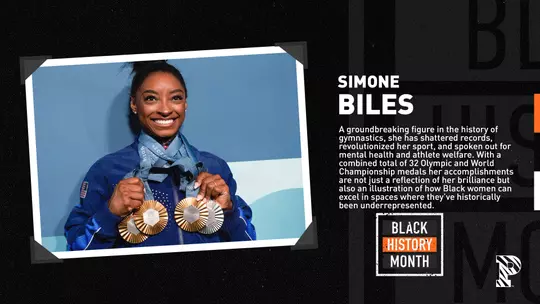
Simone Biles, born on March 14, 1997, in Columbus, Ohio, has become one of the most iconic athletes of her generation and a groundbreaking figure in the history of gymnastics. As a Black woman who has shattered records, revolutionized her sport, and spoken out for mental health and athlete welfare, Simone Biles has redefined what it means to be an athlete, especially for Black women in sports. Her story is one of resilience, empowerment, and transformation, and her impact reaches far beyond the gymnastics mat.
Simone’s early years were filled with hardship, but they also laid the foundation for her later success. Raised in foster care due to her mother’s struggles with addiction, Biles was adopted by her maternal grandfather, Ron Biles, and his wife, Nellie. They provided her with a stable, loving home, which allowed Simone to thrive and pursue her passions.
Simone's journey into gymnastics began when she was just six years old. After attending a daycare field trip to a gymnastics center, she showed natural talent and was quickly enrolled in the program. From that moment, it was clear that she had an exceptional gift. Despite facing significant challenges early in life, including the trauma of being in foster care, Simone's determination and work ethic would propel her into the global spotlight in the years to come.
Simone Biles began competing in gymnastics at a young age, and by 2013, she had already made her mark on the sport. However, it was at the 2016 Rio Olympics that Simone became a household name. At the age of 19, she won four gold medals and one bronze, solidifying her as one of the greatest gymnasts of all time. Her performance at the Rio Olympics not only left a lasting legacy in gymnastics but also demonstrated the incredible potential of Black women in a sport that had been historically dominated by white athletes.
Simone Biles is the most decorated gymnast in history, with a combined total of 32 Olympic and World Championship medals, including 25 World Championship medals—four of which are golds in the all-around competition. Her collection of achievements has made her a dominant force in gymnastics, but more than that, her accomplishments as a Black woman in the sport have served as a powerful statement about breaking barriers and challenging the status quo.
Biles’ accomplishments are not just a reflection of her brilliance but also an illustration of how Black women can excel in spaces where they’ve historically been underrepresented. When Simone entered the gymnastics scene, the sport was still largely white-dominated, but her success paved the way for other Black women to pursue and succeed in gymnastics.
She is often hailed for her contributions to making gymnastics more accessible and representative of diverse backgrounds, giving young Black girls role models who look like them and who have the opportunity to dominate in sports that were once seen as out of reach for them. Simone Biles' achievements have thus not only transformed the sport of gymnastics but have also been an important symbol of empowerment for Black women, illustrating that they can overcome obstacles and excel in any field they choose
One of Simone Biles’ most significant contributions to society and sports culture has been her advocacy for mental health awareness. In 2021, at the Tokyo Olympics, Simone made the bold decision to withdraw from several events to prioritize her mental health. In doing so, she shifted the conversation around athletes’ well-being, challenging the stigmas around mental health and performance pressure, especially in high-stakes environments like the Olympics.
Simone’s withdrawal from the competitions was met with both support and criticism, but it sparked a global dialogue on the importance of mental health in sports. Her decision resonated with athletes across all disciplines, particularly Black women, who often face disproportionate levels of scrutiny, pressure, and expectations. Simone’s courage to step away when needed demonstrated a powerful form of self-care and empowerment that is often overlooked in discussions about athleticism.
By prioritizing her mental health, Simone Biles used her platform to show the world that it is possible to be both an incredible athlete and a person who must also take care of their mental and emotional well-being. She challenged the idea that athletes must always push through physical and mental strain, and in doing so, she became a trailblazer for mental health advocacy within the sports world.
Simone’s legacy extends beyond her gold medals and historic performances. She has become a symbol of excellence and resilience for Black women and girls everywhere. Through her advocacy, her athletic achievements, and her continued work to inspire others, Simone has encouraged countless young athletes, particularly Black girls, to dream big and pursue their own passions, no matter the obstacles they may face.
Simone’s influence has led to changes in how gymnastics, and sports in general, are viewed. She has opened doors for more diversity in the sport and shown that Black women can—and will—dominate in areas that were once inaccessible to them. With her success, she has reshaped the narrative for young Black girls aspiring to be athletes, showing them that no dream is too big, and no feat is out of reach.
As we celebrate Black History Month, we honor Simone Biles not only for her athletic prowess but for the ways she continues to use her platform to uplift others. Simone Biles represents the power of representation, the importance of mental health, and the endless possibilities that lie ahead when one dares to dream beyond limitations. Her journey continues to inspire the next generation of Black athletes and women everywhere to rise, challenge, and redefine what is possible.
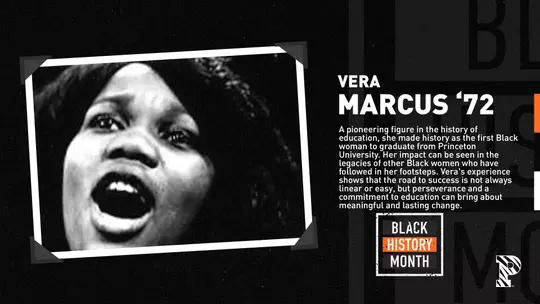
Vera Marcus, a pioneering figure in the history of education, made history as the first Black woman to graduate from Princeton University.
Vera Marcus was born in 1947 in the United States, a time when segregation and racial discrimination were still deeply embedded in American society. Raised in a time when Black women had few opportunities in higher education and were often restricted to limited roles in society, Marcus was determined to carve out a different path. From a young age, she exhibited a profound curiosity for learning and was dedicated to excellence, even in environments where Black students were often marginalized.
Her academic drive set her apart, and she excelled in her schooling despite the systemic challenges faced by Black students, particularly Black women. Vera’s experiences growing up shaped her perspective on the importance of education as a tool for empowerment and social change. She was deeply aware of the historical and social contexts that made her path to higher education unique, and that awareness fueled her determination.
In 1972, Vera Marcus made history when she became the first Black woman to graduate from Princeton University, one of the most prestigious Ivy League institutions. At a time when Ivy League universities were overwhelmingly white and predominantly male, Marcus’ admission to Princeton was a major milestone in the push for racial and gender integration in elite academic spaces.
Entering Princeton as an undergraduate was a daunting challenge, not just because of the academic rigor of the institution, but because of the societal prejudices that Black students—particularly Black women—faced. Marcus was entering an environment where she was often one of the few, if not the only, Black student in her classes. This experience of isolation and alienation was common for Black students at the time, but Marcus persisted, excelling in her academic pursuits while also breaking down barriers for those who would follow.
Her years at Princeton were marked by both academic achievement and an unwavering commitment to diversity and social justice. In addition to her studies, she was deeply involved in student activism, advocating for greater inclusion of Black students and faculty. Her perseverance and resilience, navigating both the personal and institutional challenges of being a Black woman in an elite university, laid the groundwork for future generations of Black women seeking higher education.
Vera Marcus’ accomplishment at Princeton was not just a personal triumph; it had a broader, far-reaching impact. By breaking the color and gender barriers at one of the most prestigious universities in the country, Marcus paved the way for future generations of Black women to aspire to the highest academic and professional goals. She served as an example that it was possible to succeed in elite institutions despite the institutional barriers that sought to keep Black women out.
Her achievement was especially significant in the context of the civil rights and women’s rights movements that were gaining momentum during her time at Princeton. The late 1960s and early 1970s were formative years for these movements, and Vera’s presence at Princeton reflected the growing demands for racial and gender equality within the academic world. She became a symbol of perseverance and hope for Black women who wanted to pursue education at the highest levels, demonstrating that barriers could be overcome with dedication, strength, and vision.
After her graduation, Vera Marcus went on to have a distinguished career in various fields, contributing her talents and insights to both academic and professional realms. While details about her career after Princeton are not widely known in public records, it is clear that her path as the first Black woman graduate of the prestigious university served as an inspiration for others. Her story has been passed down through generations of women and students, particularly Black women who faced similar obstacles in their pursuit of education and success.
Her impact can be seen in the legacies of other Black women who have followed in her footsteps at Princeton and other Ivy League schools. Vera's experience shows that the road to success is not always linear or easy, but perseverance and a commitment to education can bring about meaningful and lasting change.
Vera Marcus’ contribution to breaking educational barriers for Black women also extended to her role as an advocate. As institutions of higher learning slowly began to reckon with their legacies of exclusion, Marcus’ experience became a part of the wider conversation about the need for institutional reform to better support Black students and faculty.
Vera Marcus has not only earned a place in history as a barrier-breaking academic, but her story is an enduring inspiration for Black women striving to push the boundaries of what is possible in education. Her success as the first Black woman to graduate from Princeton University was a defining moment in the long struggle for racial and gender equality in higher education.
Vera Marcus’ place in history is a testament to the power of education as a tool for liberation and empowerment. Her journey reminds us all of the importance of perseverance, advocacy, and the transformative power of breaking barriers. Through her courage and achievements, Vera Marcus has become a beacon of hope and possibility for Black women in higher education.
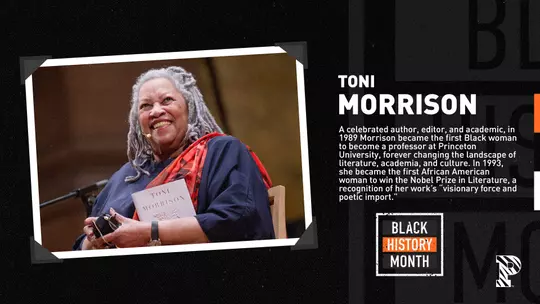
Toni Morrison, born Chloe Anthony Wofford on February 18, 1931, in Lorain, Ohio, is one of the most profound and influential voices in American literature. As a celebrated author, editor, and academic, Morrison became the first Black woman to become a professor at Princeton University, forever changing the landscape of literature, academia, and culture. Known for her deep exploration of race, identity, and the Black experience, Morrison's work transcended the boundaries of literature to become a voice for those who had long been marginalized and silenced in both society and the literary world.
Her groundbreaking work in literature and education, combined with her unwavering commitment to amplifying the stories of Black women, solidified her as an innovator—an icon whose influence continues to inspire generations of readers, writers, and scholars, particularly Black women seeking a platform in academia and literature.
Toni Morrison was born to a working-class African American family in Ohio, and her upbringing was shaped by both the challenges and cultural richness of the Black community. Growing up during the Great Depression and facing the racial segregation of the time, Morrison learned the importance of storytelling, community, and self-identity. She was a voracious reader, finding solace in books that connected her to a broader world while also affirming her own experiences as a Black woman in America.
Morrison pursued higher education at Howard University, where she studied English and the classics. It was at Howard that she first encountered a deep sense of solidarity with other Black intellectuals, a sense of community that would influence her career both as a writer and as a scholar. After completing her undergraduate degree, she went on to earn a master's degree in English from Cornell University, further solidifying her academic foundation.
Her time at Howard and Cornell was instrumental in shaping Morrison’s understanding of the power of literature and storytelling to shape identity, history, and culture, particularly the lives of Black people in America.
In 1989, Morrison made history when she became the first Black woman to be appointed a professor at Princeton University. Her arrival at Princeton was a monumental moment in the history of higher education, a step forward in the fight for greater representation of Black women in academia. Her appointment was not just a personal achievement but a profound statement about the changing tides in higher education, particularly in terms of diversity and inclusion.
Morrison’s position at Princeton brought her into the academic elite, but she remained fiercely committed to the students and the communities from which she came. Her teaching philosophy was centered on empowering her students—especially students of color—by introducing them to literature that spoke to their experiences and exploring the literary canon through the lens of race, gender, and cultural history.
Her tenure as a professor was not only groundbreaking because of her race and gender but also because of the intellectual depth and radical ideas she introduced into the academic world. Morrison’s approach to literature and teaching helped to diversify the curriculum, opening doors for Black authors and scholars who had long been overlooked in mainstream academic circles. She was a vital force in shaping Princeton’s literature and African American studies programs, and her legacy as a trailblazer in higher education continues to inspire scholars today.
Toni Morrison’s literary achievements are nothing short of monumental. Her works have received critical acclaim for their innovative storytelling, rich historical context, and powerful explorations of race, trauma, and identity. She is perhaps best known for her novels Beloved, Song of Solomon, Sula, and The Bluest Eye. These works stand as powerful testaments to the depth of the Black experience in America and are celebrated for their complex characters, poetic prose, and ability to confront the painful legacies of slavery, racism, and gender inequality.
Her novel Beloved (1987) is widely regarded as her masterpiece and won the Pulitzer Prize for Fiction. It is a haunting and transformative work that explores the legacy of slavery through the story of Sethe, a former enslaved woman haunted by the ghost of her deceased daughter. Beloved not only explored the psychological and emotional trauma of slavery but also redefined the narrative of Black womanhood in literature, highlighting the strength, pain, and resilience of Black women as they struggled to reclaim their identities and histories.
Toni Morrison’s work consistently challenged readers to confront uncomfortable truths about race and history. Her stories often dealt with the complexities of Black identity, the burden of history, and the intergenerational trauma experienced by African Americans. Her writing was unapologetically bold, introspective, and deeply human, presenting her characters in all their complexity, joy, pain, and resilience.
Morrison’s contributions to literature were widely recognized, earning her numerous prestigious awards and honors. In 1993, she became the first African American woman to win the Nobel Prize in Literature, a recognition of her work’s “visionary force and poetic import.” In addition to the Nobel, she received the National Book Critics Circle Award, the American Academy of Arts and Letters Award, and the Presidential Medal of Freedom, among many others.
Throughout her career, Morrison was an unapologetic advocate for the voices of Black women, ensuring that their stories were told with dignity, complexity, and authenticity. She often remarked on the importance of writing for herself and other Black women, stating that she wrote for the women she grew up with—those whose lives were too often ignored or minimized by mainstream literature and history.
Morrison’s writing was a tool for reclaiming and reimagining Black womanhood, and she was deeply committed to creating a space for Black women to be seen and heard. Her work provided a counter-narrative to the stereotypical portrayals of Black women that dominated popular culture. In her novels, she gave Black women a voice—an identity beyond the narrow confines of subjugation, and instead, full of depth, power, and agency.
In her capacity as a professor, she inspired countless students—many of whom were Black women—to pursue careers in literature, writing, and academia. Her mentorship empowered Black women to see themselves as legitimate voices in the world of literature and scholarly inquiry, and her teaching was instrumental in shaping the future of African American studies in academia.
Toni Morrison’s legacy is multifaceted and far-reaching. As the first Black woman professor at Princeton University, she broke new ground in academia, creating a pathway for other Black women to follow. As a writer, her works forever changed the landscape of American literature, offering a profound and deeply human examination of race, identity, and history. As a cultural innovator, she empowered Black women by amplifying their voices and ensuring their stories were not only told but celebrated.
As we celebrate Black History Month, we honor Toni Morrison not just for her literary genius, but for how she broke down barriers, challenged systems of exclusion, and paved the way for future generations of Black women to carve out spaces for themselves in literature, academia, and beyond. Her life and work stand as a powerful reminder of the importance of representation, the transformative power of storytelling, and the enduring legacy of Black women in shaping the world.
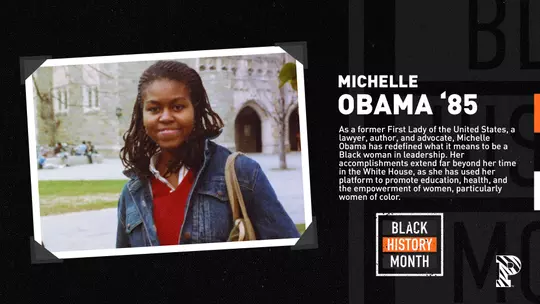
Michelle LaVaughn Robinson Obama, born on January 17, 1964, in Chicago, Illinois, is one of the most influential and inspiring figures of the 21st century. As a former First Lady of the United States, a lawyer, author, and advocate, Michelle Obama has redefined what it means to be a Black woman in leadership. Her accomplishments extend far beyond her time in the White House, as she has used her platform to promote education, health, and the empowerment of women, particularly women of color.
As a Princeton University graduate, Michelle Obama broke barriers and set the stage for future generations of Black women to follow in her footsteps. Her journey to success has not only been a personal triumph but has also had a profound impact on the representation and influence of Black women in education, politics, and society. In celebration of Black History Month, Michelle Obama's legacy is a testament to the power of perseverance, representation, and the importance of uplifting marginalized voices.
Michelle Obama grew up on the South Side of Chicago, where she was raised by her working-class parents, Fraser and Marian Robinson. Her father, a pump operator for the city’s water plant, and her mother, a homemaker and volunteer, instilled in her the importance of education, discipline, and hard work. Despite facing challenges as a Black child in a predominantly white, middle-class school, Michelle excelled academically, earning top grades and gaining the attention of college recruiters.
Michelle attended Princeton University, where she became one of the few Black students at the prestigious Ivy League school. At Princeton, Michelle majored in Sociology with a concentration in African American studies, navigating a world where Black students were often in the minority. Despite facing challenges with racism and isolation, Michelle thrived academically, earning a degree in 1985. Her experience at Princeton was transformative, giving her the tools to navigate predominantly white spaces and empowering her to advocate for greater diversity and inclusion.
Michelle’s time at Princeton helped her develop a deep commitment to social justice and equity. She became involved in various student organizations focused on supporting Black students and creating more inclusive environments on campus. Michelle’s accomplishments at Princeton laid the foundation for her future work as an advocate for educational access and equality.
After graduating from Princeton, Michelle went on to attend Harvard Law School, where she earned her J.D. in 1988. At Harvard, she was one of the few Black women in her class, and she faced both the academic rigor of the law school and the challenges of navigating predominantly white and male spaces. However, she continued to excel, earning her law degree while also becoming involved in community service and public outreach.
After completing her education, Michelle worked at prestigious law firms, including Sidley Austin in Chicago, where she met her future husband, Barack Obama. She also worked in the public sector, dedicating her time to addressing issues of community development and youth empowerment. Michelle’s career was defined by her commitment to giving back to underserved communities, particularly those in her hometown of Chicago.
Michelle’s professional work focused on supporting and empowering others, particularly those who faced systemic barriers to success. She served as the executive director of Public Allies, a national service organization that helped young people from diverse backgrounds find careers in public service, before becoming the Vice President of Community and External Affairs at the University of Chicago Hospitals.
Michelle Obama’s most widely recognized role came when she became the First Lady of the United States in 2009, following her husband’s election to the presidency. As First Lady, Michelle used her platform to advocate for a wide range of causes, including education, health, and military families. She was particularly passionate about issues that impacted children and women of color.
One of her most significant initiatives was the Let’s Move! campaign, which aimed to combat childhood obesity by promoting healthy eating, exercise, and access to nutritious foods. As part of this initiative, Michelle launched the White House Garden, which highlighted the importance of healthy, locally sourced food and encouraged families across the country to eat better. She also promoted physical activity in schools and worked to improve the quality of school lunches.
Michelle’s Reach Higher initiative was another key part of her time as First Lady, focused on encouraging young people to pursue higher education, particularly those from underrepresented communities. Through Reach Higher, Michelle worked to close the achievement gap by inspiring students to dream big and access the resources they needed to succeed in college and beyond. She also advocated for making college more accessible and affordable for students from low-income backgrounds, helping to break down the barriers that prevent many young people, especially young people of color, from attaining higher education.
In addition to her advocacy work, Michelle also became a global ambassador for girls' education. She traveled internationally, promoting the importance of education for girls, particularly in developing countries, where access to education for girls is often limited. Her efforts to champion girls' education helped elevate the global conversation about the importance of investing in girls' futures.
After leaving the White House, Michelle Obama continued to inspire and uplift others through her work. In 2018, she released her memoir, Becoming, which became an instant bestseller and resonated deeply with readers around the world. In the book, Michelle shared her personal journey, from her humble beginnings in Chicago to her role as First Lady, and offered insight into the challenges she faced as a Black woman navigating spaces of power and influence.
Michelle’s memoir was not just a reflection on her own life, but a celebration of the resilience, strength, and potential of Black women everywhere. Through Becoming, she connected with readers of all backgrounds and inspired people to strive for personal and societal change.
Today, Michelle Obama remains an influential figure, continuing to advocate for education, equality, and the empowerment of women, particularly women of color. Through her initiatives, her writing, and her public speaking, Michelle continues to serve as a role model and a beacon of hope for Black women and girls everywhere.
In celebration of Black History Month, we honor Michelle Obama not only for her achievements but for her unwavering commitment to creating a more inclusive, equitable world. Her legacy is one of empowerment, inspiration, and the belief that Black women can lead, shape, and transform the world in profound ways.








